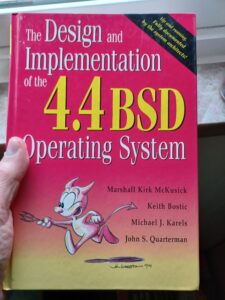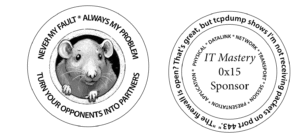I’ve been using Apache since the 1990s. The networking book requires information about QUIC, so I need experience with QUIC, so I need HTTP/3, so I can’t use Apache.
I experimented with Caddy on my test host. It worked well as a reverse proxy, so I began putting it in place in production this weekend. (If you deploy Caddy, definitely have it run as a user other than root!)
As I went through the docs to prepare, though, I realized that not only would it would be less complex and more robust to drop Apache and use Caddy, it would also be easier.
My Apache configuration files are large and complex because Apache can do anything. I don’t need a web server that can do anything. I need a web server that serves static files, talks to php-fpm, and supports TLS. The Caddy docs are complete, but I didn’t find a simple guide for what I wanted to do, so I’m posting this. I suspect that guide exists but is buried beneath pages of search engine poison.
This uses Caddy 2.9.1 on FreeBSD 14. My config files are in /usr/local/etc/caddy, symlinked to /etc/caddy.
The main config file, /etc/caddy/Caddyfile contains only:
import sites/*conf
The /etc/caddy/sites directory contains each of my sites in its own file. Mostly.
Here’s one of my old sites in blackhelicopters.org.conf:
blackhelicopters.org www.blackhelicopters.org {
root * /var/www/bh
file_server
log {
output file /var/log/bh/bh-caddy.log
format json
}
}
The first entry on the first line is the server’s main name, blackhelicopters.org. (I could probably let that domain go, but my oldest friends have that email in their address books and it’s worth a couple bucks a year to not inconvenience them.) The following hostnames are what Apache would call ServerAlias entries: other names this host responds to. Every name here goes into the X.509 certificate.
The root statement tells Caddy where to find the files for this site. Every URL goes under here. If I had Apache Directory statements, I could put them here.
The file_server statement means “hand out files.”
Last, there’s a logging statement. Caddy logs are written in JSON, making them harder to eyeball but easier to mechanically parse. Pipe the logs through jq(1) to read the parts you want.
Several of my domains exist only as legacy redirects. While https://michaelwlucas.com and https://michaelwarrenlucas.com made sense in a keyboard-centric era, they’re a pain to type on a phone.
blather.michaelwlucas.com www.michaelwarrenlucas.com michaelwarrenlucas.com www.michaelwlucas.com michaelwlucas.com mwlucas.org www.mwlucas.org {
redir https://mwl.io
}
This config doesn’t even serve files. It’s like setting DocumentRoot to /var/empty. Any traffic to these hostnames should be redirected to my current web site.
So what about that all-important main web site?
mwl.io www.mwl.io {
tls mwl@mwl.io
log {
output file /var/log/mwl/io-caddy.log
format json
}
root * /var/www/io
file_server
php_fastcgi localhost:9000
@disallowed {
path /xmlrpc.php
path *.sql
path /wp-content/uploads/*.php
path *~
}
rewrite @disallowed 'index.php'
redir "/ks" https://www.kickstarter.com/projects/mwlucas/mwls-next-1-april-book"
...
}
the tls statement puts my email address in the Let’s Encrypt certificate request. I should probably go back and add that to the sites I did earlier.
The php_fastcgi option tells Caddy where to find the php-fpm engine.
The @disallowed statement defines a list named “disallowed.” The following rewrite statement transforms requests to files with those names, redirecting them to the index.
Finally, I have several redirect statements for my convenience.
Test a configuration by going to /etc/caddy and running caddy validate, much like apachectl configtest. The configuration files are JSON, so the parser isn’t quite as straightforward as you might expect.
# caddy validate
2025/05/05 15:02:38.489 INFO using adjacent Caddyfile
2025/05/05 15:02:38.489 INFO using config from file {"file": "Caddyfile"}
Error: adapting config using caddyfile: /usr/local/etc/caddy/sites/test-twp.conf:1: unrecognized directive: test.tiltedwindmillpress.com
Did you mean to define a second site? If so, you must use curly braces around each site to separate their configurations.
Here’s the problem: the error is not where it says the error is. The error is before the cited point. The sensible thing to do is to test after creating each site’s configuration file. If you get bored and do all your sites while watching reruns of Adam and Jamie welding JATO units to a hamster ball so they can replicate that urban legend about the Syria-Guam War, you’ll have to do a binary search of your files to see where the problem is. Test each one as you finish it.
Once you have a parseable configuration, shut off Apache and start Caddy. Watch /var/log/caddy/caddy.log for errors. Test all of your sites.
Am I happy with Caddy? Yes, so far. Am I keeping my known-working Apache configuration around? Also yes, so far. If I suffer an attack of the AI scrapers, I might need to fall back to a Caddy reverse proxy so that I can implement Anubis. Yes, there’s an Anubis Caddy module but it’s a proof-of-concept.
What kind of impact has Caddy had on my site? It seems faster, but that might be QUIC aka HTTP/3 rather than any difference between Caddy and Apache. Of course, QUIC is a difference between the two. How much of my traffic is QUIC now? QUIC runs on UDP port 443. First, let’s check how much traffic went to and from port 443 yesterday, on all protocols.
# nfdump -R . -B ip 23.139.82.3 and port 443
...
Summary: total flows: 58605, total bytes: 6.9 G, total packets: 7.0 M, avg bps: 1.0 M, avg pps: 127, avg bpp: 990
Time window: 2025-05-04 00:00:00 - 2025-05-04 23:59:59
6.9 GB. How much of that is UDP?
# nfdump -R . -B ip 23.139.82.3 and port 443 and proto udp | tail -4
Summary: total flows: 1620, total bytes: 428.4 M, total packets: 412444, avg bps: 62756, avg pps: 7, avg bpp: 1038
Time window: 2025-05-04 00:00:00 - 2025-05-04 23:59:59
Total flows processed: 750342, passed: 1620, Blocks skipped: 0, Bytes read: 66537172
Sys: 0.0209s User: 0.0209s Wall: 0.0399s flows/second: 18806544.9 Runtime: 0.0423s
428.4 Mb of my traffic is QUIC? Firefox and Chrome derivatives both use QUIC if available. The only clients that should be using TCP are stupid bots and crawlers–
Oh. Maybe I do need to implement Anubis. Dammit.




